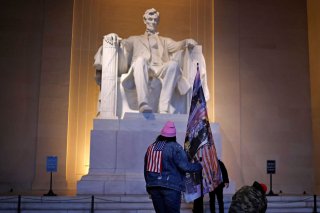American Empire Gives a False Sense of Domestic Security
America’s strategic distraction has favored addressing foreign threats and those domestically with a foreign aspect, leaving a wide space for domestic extremism to go unchecked.
IT IS true and a great point of national pride that the United States was the first modern experiment in democracy and that her founding documents inspired dozens of other countries’ forms of representative government. But that sense of exceptionalism has become interpreted as indispensable and exceptional in the world instead of exceptional at home. It is not merely the money lavished on overseas adventures, but that disproportionate amount of money represents America’s priorities. The United States is now paying that price by neglecting the educational and economic prospects of the people who feel forgotten, ignored, and they are unprepared to function effectively in twenty-first-century America. Their lack of basic civics knowledge, lack of media literacy, lack of critical thinking in a contested information environment, and mistrust of government institutions combined to threaten American national security from within.
For the shameful display in the Capitol, America found itself uncomfortably on the wrong side of the sort of canned foreign government press statements that it is only ever accustomed to dishing out from the State Department briefing room. “We are following with concern the internal developments happening in the U.S.” stated the Turkish Foreign Ministry. Taking a page from the well-worn playbook of American moral authority, the Turks added: “We call on all parties in the U.S. to maintain restraint and prudence.” Such thinly veiled trolling suggests that autocrats around the world must have enjoyed how the tables of smug righteousness have turned. Even the developing world pulled no punches in their commentary upon the shambles. “Who’s the banana republic now?” asked Kenya’s largest daily newspaper.
While autocratic, corrupt, and repressive regimes are not comparable to America, it will fall to other Western democracies to hold the megaphone of accountability. Surely, American officials can no longer comment on other countries’ elections no matter the scale of the farce—because, at least in the short term, they lost the moral authority to monitor or criticize other elections. Eight members of the Senate—supposedly the “world’s greatest deliberative body”—joined 139 members of the House of Representatives who objected to certifying the electoral college vote prior to a special commission report investigating allegations of election irregularities, apparently mirroring millions of Americans in falsely claiming that the election was “rigged” and riddled with “irregularities,” therefore producing an “illegitimate” outcome. So illegitimate, in fact, that some rioters shed the blood of fellow Americans, and were prepared to shed much more. Indeed, America’s moral authority and example are badly tarnished, and simply closing the chapter on the Trump administration does not relegate the damage to dusty history books chronicling a mere aberration in U.S. history.
Given the self-inflicted wounds of the Trump administration’s dying days, the beginning of the Biden administration seems an opportune time to link a period of national healing to a national strategic reset. Instead of another reset button with Vladimir Putin, the United States needs to renew itself. America’s strength, built in part on the ideas of John Locke, requires the consent of the governed. Likewise, it requires a government that has earned its citizens’ consent through good governance and trust. In his view of republicanism, Thomas Jefferson argued that part of civic virtue was uplifting the common people and preparing them to take part in the great experiment in self-governance. For it to function properly, America needs an educated society that understands—at a factual level—how their country works, knows what their civic duties are, and respects the rule of law—America’s “political religion” according to Lincoln. That will take a massive investment in American education, but not the tendentious weaponization of American history as represented both by the highly-flawed 1619 Project or the flag-waving “patriotic education” offered by the 1776 Commission.
This period of crisis is an opportunity for national introspection and should not be squandered or quickly forgotten. We need to drink it in, to appreciate its severity, and to be humbled by it. Americans have looked at the brink, and thankfully most have recoiled. The Capitol insurrection may be recorded by future historians as another “crisis of confidence” in America, to borrow President Jimmy Carter’s phrase. A stunning number of Americans and a dismaying number of their cynical elected officials lost confidence in America’s electoral processes, institutions, judges, and the rule of law. This must be regained for America to endure and once again shine as an example to the world. If we do not, we will have no foreign enemy to blame. Lincoln had it right: “If destruction be our lot we must ourselves be its author and finisher. As a nation of freemen, we must live through all time or die by suicide.”
David V. Gioe is Associate Professor of History at the U.S. Military Academy at West Point, where he also serves as History Fellow for the Army Cyber Institute. He is a former Central Intelligence Agency operations officer and a veteran of the U.S. Navy. This analysis is his alone and does not represent the position of West Point, the Department of Defense, or the United States government.
Image: Reuters

